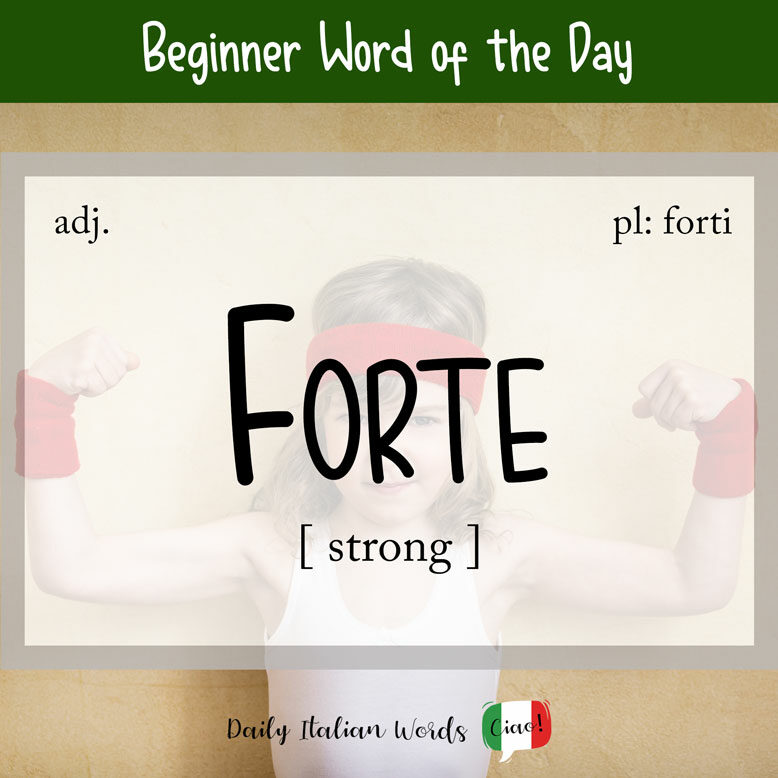You may already be familiar with the word forte, as it is the term we use in English for a thing at which someone excels (in other words, someone’s strong suit). Although this meaning exists in Italian as well, the primary meaning of forte (plural: forti) is strong.

Carlo è forte ma se la tira troppo.
Carlo is strong but he shows off too much.
L’umiltà non è proprio il suo forte.
Modesty isn’t exactly his forte.
Forte doesn’t have obvious feminine or feminine plural forms. This is because forte ends in an e rather than an o. When describing female nouns, it remains forte and forti respectively.
Mia sorella è molto più forte di me.
My sister is much stronger than me.

To say very strong in Italian, you can either place the adverb molto in front of the word (molto forte) or add -issimo/a/i/e to the end (fortissimo/a/i/e).
The meaning of forte isn’t limited to strong. Depending on the context, it can also mean tenacious, intense, fast and even talented.
- Quel bambino ha un carattere forte. = That child is tenacious.
- Questa birra ha un sapore piuttosto forte. = This beer has a rather intense flavour.
- L’autista sta andando troppo forte. = The driver is going too fast.
- Quella squadra è davvero forte a pallavolo. = That team is really good at volleyball.
You will also hear teenagers and young people using the word forte as a slang term for cool or amazing.
Guarda quella macchina! – Troppo forte! Ne voglio una anch’io!
Look at that car! – So cool! I want one too!
If you are forte di qualcosa, you are backed by or enjoy the support of something.
Il nostro team è forte di un’esperienza decennale nel settore.
Our team is backed by ten years of experience in the sector.
When used as an adverb, forte can once again be translated in numerous ways. Some of the most common equivalents in English include strongly, loudly and heavily.
Ha cominciato a piovere forte ieri notte.
It started raining heavily last night.
Parla forte! Non ti sento!
Speak up! I can’t hear you!
If you find yourself unable to stop doing something that you know you probably shouldn’t do, a very useful way of excusing your bad behaviour is to use the expression È più forte di me! Literally it translates as It is stronger than me! but the actual English translation would be closer to I can’t help it! or I can’t resist!
Basta mangiare il cioccolato o ti farà male la pancia! – Non posso, è più forte di me!
Stop eating chocolate or you’ll get a poorly tummy! – I can’t help it!
This expression also happens to be the name of the famous song by the Italian singer Ligabue:
And if that weren’t enough, you’ll also see the word forte in many colloquial sayings, including:
- Sii forte! = Hang in there!
- Tieniti forte! = Hold on to your hat! / You ready? / Brace yourself!
- Puoi dirlo forte! = You can say that again! / You’re telling me!
Finally, forte as a noun means fort, as in a fortified building.
Heather Broster is a graduate with honours in linguistics from the University of Western Ontario. She is an aspiring polyglot, proficient in English and Italian, as well as Japanese, Welsh, and French to varying degrees of fluency. Originally from Toronto, Heather has resided in various countries, notably Italy for a period of six years. Her primary focus lies in the fields of language acquisition, education, and bilingual instruction.


